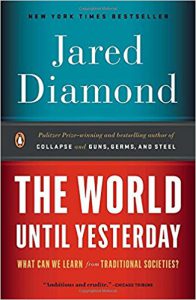The World Until Yesterday: What Can We Learn from Traditional Societies? by Jared Diamond
The World Until Yesterday: What Can We Learn from Traditional Societies?
By Jared Diamond
Viking
Four Stars
Reviewed by Jessica Gribble
It’s no surprise that Jared Diamond’s most recent book, The World Until Yesterday, has been widely discussed and excerpted. Diamond is known as an astute thinker who tries to answer big, interesting questions about why the modern world is the way it is. In Guns, Germs, and Steel, he asks why the peoples of certain continents succeeded in invading other continents and conquering or displacing their peoples. Collapse explores how climate change, the population explosion, and political discord create the conditions for the collapse of civilization. And The World Until Yesterday studies traditional societies because “they retain features of how all of our ancestors lived for tens of thousands of years, until virtually yesterday. Traditional lifestyles are what shaped us and caused us to be what we are now.”
There are many things to like, including Diamond’s conversational writing style and his wealth of examples, mostly from his scientific research in New Guinea. It’s fascinating to hear stories about people who haven’t yet been Westernized. For instance, Diamond spends the better part of a chapter explaining the different ways societies handle risk. Not only do traditional people feel threatened by different things (snakes or bands of marauders), they have to be cautious about them every time. Snakes and marauders can kill you the first time you’re too cavalier. Westernized people are governed by states and have access to hospitals.
One of the excellent chapters in the book discusses the evolution of religion. Comparing it to the evolution of electric eels, which evolved from shockless eels to those that can administer 600 volts, Diamond argues that religion has likely served many functions during the course of human history, each one a by-product of particular features of the brain. Diamond is at his best as an evolutionary biologist, teaching us new ways to understand the world.
There are certain peculiarities that you just have to suffer through to get to the interesting parts of Diamond’s work. He calls everyone he’s ever met a friend. Though his writing is clear and easy to follow, it’s sometimes condescending. For instance, he writes about the dangers traditional foragers and farmers face, which “illustrate the modified Wayne Gretzky principle: if one takes no shots, then one will miss no shots but one is also guaranteed to score no goals.” Most readers will understand that foragers and farmers must “balance hazards against the overriding need for a steady stream of scores” without the Wayne Gretzky example. Diamond also tends to lecture: after a section on dietary sources of salt (which was very limited in many traditional diets), he writes “You, too, can enjoy great food and be healthy.”
I wish there were more examples from non–New Guinean societies. It would be interesting to see how Diamond’s conclusions apply (or not) to other traditional cultures. I often got the sense that he really wanted to write a book about his travels, friends, and studies in New Guinea, but that he felt he had to write a book with big conclusions. We WEIRDs (people from Western, educated, industrialized, rich, and democratic societies) can certainly apply some traditional insights and behaviors to our own lives, but the book would be equally interesting as a window into those societies without the lecturing and bossiness. Readers can draw their own conclusions.
The book covers a wide range of topics: war and peace, bringing up children, the treatment of old people, danger and response, religion, language, and health. We can learn a lot from Diamond the biologist; I just wish Diamond the narrator left us alone to digest his experience and insight.
